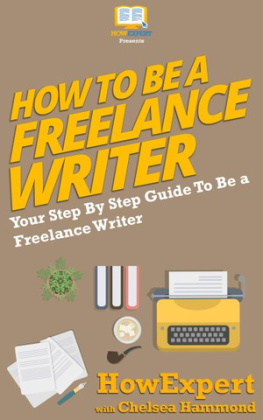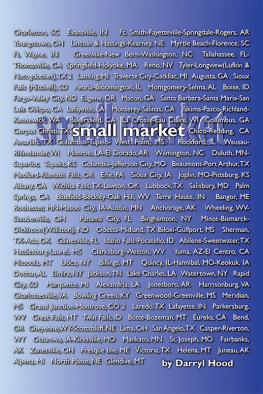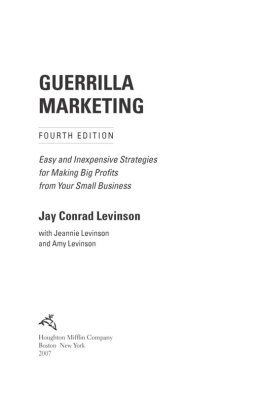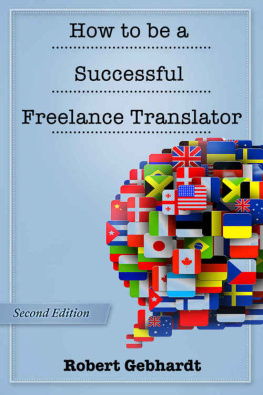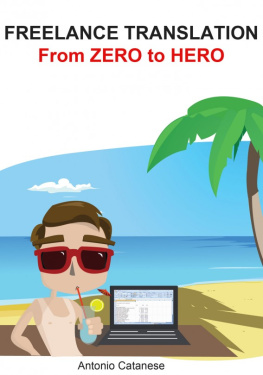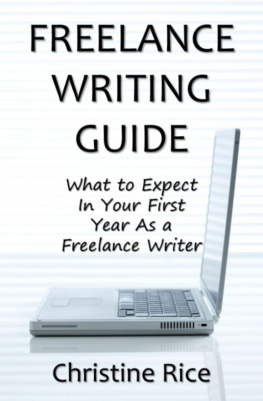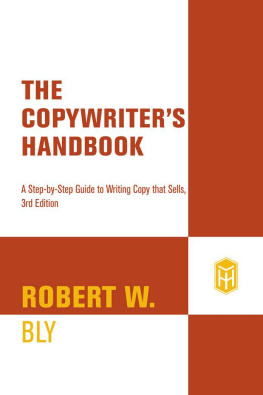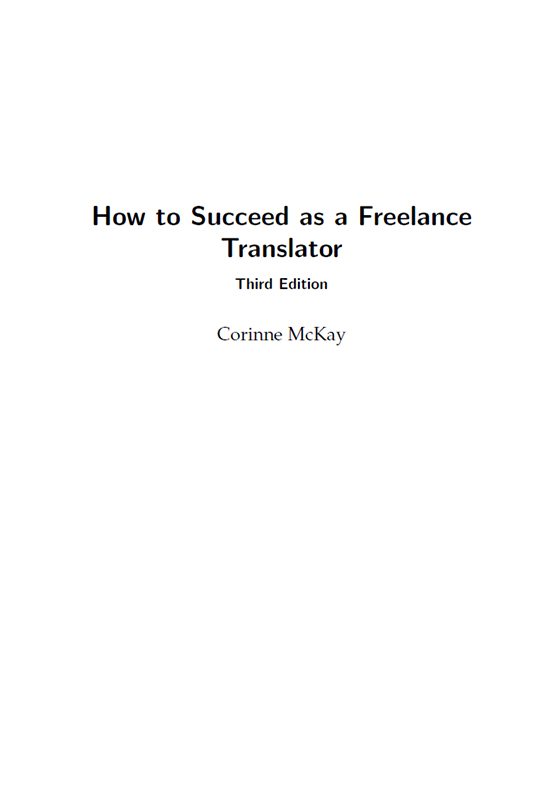Disclaimer: This book is published by Two Rat Press and Translatewrite, Inc., who acknowledge all trademarks. All information contained in this book is believed to be correct at the time of printing. However, readers are advised to seek professional advice where necessary, as the information in this book is based on the authors experiences. The author of this book is not professionally engaged in providing legal, financial or career planning advice. Please send comments or corrections to .
2015 by Corinne McKay. All Rights Reserved. No part of this book may be reproduced or transmitted in any form or by any means, electronic or mechanical, including photocopying, recording, or by any information storage or retrieval system, except by a reviewer who may quote brief passages in a review, without permission in writing from the author. ISBN: 978-0-578-17007-7 eISBN: 978-1-483-56339-8
Contents
Acknowledgments
Thank you to everyone who provided feedback on the first and second editions of this book, encouraged me to keep writing, and suggested improvements for the third edition. Especially Eve Bodeux, Lillian Clementi, Chris Durban, Melanie Guedenet, Marian Greenfield, Jonathan Hine, Judy and Dagmar Jenner, Freek Lankhof, Karen Mitchell, Marianne Reiner, Jill Sommer, Karen Tkaczyk, Caitilin Walsh, Tess Whitty and Jane Wolfrum. A huge thank you to Jost Zetzsche for agreeing to write the technology chapter. The biggest thanks go to my familyDan and Ada Urist and Bruce and LaNelle McKay, without whose love, encouragement and support it would be hard to succeed at anything at all.
Introduction to the third edition
The freelance translation and interpreting landscape has changed dramatically since 2006, when I wrote the first edition of this book. Happily, the industry is booming; the US Bureau of Labor Statistics predicts that the demand for translators and interpreters will increase nearly 50% by 2022, which is great news for new and established translators alike. This demand has led to a corresponding increase in the number of people who would like to become translators and interpreters. This is also great news, because the next generation of translators and interpreters has to come from somewhere; but it presents some challenges to the industry as a whole. How do we assess or control quality in an industry with no barriers to entry? How do we strike a balance between our clients needs in terms of quality, speed and budget? How do we find enough translators and interpreters to work in Middle Eastern, African and Asian languages that few native English speakers know? Its an exciting time to work in our industry, and Im energized by the possibilities that the next decade offers us! Whether youre a student exploring the possibilities of translation and interpreting, or youre a veteran looking for some tips to rejuvenate your business, thank you for using this book as a resource, and feel free to join the conversation on translation-related topics on my blog Thoughts on Translation thoughtsontranslation.com.
1 A quick start guide to freelance translation
You may be deciding if freelance translation is the right career for you; or you may want an overview of the basic concepts in this book. So, lets start out with an executive summary of what you need to know about working as a freelance translator.
1.1 Who can become a freelance translator?
In the United States, there are very few barriers to entry for someone who wants to start a business as a freelance translator. There is no standard licensing procedure for freelance translators; translator certification is not available for every language, and there are successful freelance translators from a huge range of backgrounds. In theory, almost anyone who has near-native skills in at least one foreign language and is a good writer in their native language can become a translator. In practice, the majority of successful freelance translators have several qualifications in common: nearly all have at least a Bachelors degree and many have a Masters degree or higher, either in translation, in a foreign language, or in their area of specialization; they have lived or worked for an extended period of time in a country where their non-native language is spoken; they have excellent writing skills in their native language; they have in-depth knowledge of at least one specialization and they are very motivated to launch and run a business on a self-employed basis.
If you dont have a Bachelors degree, its not impossible to start a freelance translation business, but you may face some barriers that dont apply to translators with a higher level of education. Its more difficult (but not impossible) to meet the eligibility requirements for the American Translators Association certification exam; you may face competition from other translators with higher levels of education; you may face questions from clients who wonder if you are qualified to do the job. So although there is no absolute requirement that translators have a college degree, its certainly advisable to earn at least a Bachelors before launching your business.
1.2 Translator certification
Many beginning translators wonder about the importance of being certified. Because translation is largely unregulated in the United States, there is not even a standard definition of what certified means. In general, when people talk about certified translators in the United States, they are referring to translators who are certified by the American Translators Association atanet.org, but they may also be referring to translators who have completed a university-level translation certificate program.
For most translators, ATA certification, if available in your language pair, is a plus but not a must. Some clients may insist on using ATA-certified translators, some may prefer to use ATA-certified translators and others may not care about certification. At the very least, a client who is browsing online to find a translator is probably more likely to contact the certified translators first. Translation agencies often have eligibility requirements for translators who want to work for them; one of the ways to meet that requirement may be ATA certification. Compensation surveys show that ATA-certified translators earn more than those who arent certified. ATA-certified translators can also use the initials CT after their names. However, the ATA offers certification exams only for certain language combinations, the exams are open only to ATA members and taking the exam is a significant financial investment. If you would like to pursue ATA certification, you must first join the Association (as of 2015, individual membership is $190 per year), then have your eligibility verified ($35), take the exam at least once ($300), and it is definitely advisable to take a practice certification exam before you take the actual exam ($80 per passage); so its a significant investment. With the overall ATA exam pass rate hovering around 20%, you also cannot be sure that youll pass on the first try. When I took the exam in 2002, I failed the practice test by a small margin and then passed the real exam on the first try, so its definitely possible!
1.3 Interpreter certification
For interpreters, the importance of certification depends on the type of interpreting you do and where you work. Court interpreters can be certified at the state level (various language-specific tests are available, check with your state court system for specifics) or at the federal level (tests are offered in Spanish, Navajo and Haitian Creole). In some states in the U.S., it is now difficult or impossible to find work as a Spanish court interpreter unless you have state or federal court interpreter certification. For other languages, there may be no certification exams at all. Medical interpreters can take certification exams offered by the Certification Commission for Healthcare Interpreters (cchicertification.org) which offers the CHI and CoreCHI credentials, or the National Board of Certification for Medical Interpreters (certifiedmedicalinterpreters.org) which offers the CMI credential. Many elite-level conference interpreters are members of the International Association of Conference Interpreters aiic.net, which goes by its French acronym AIIC (pronounced eye-eek), and you can read about the US State Departments Conference, Seminar and Liaison Interpreter exams by visiting state.gov/m/a/ols/c56573.htm.

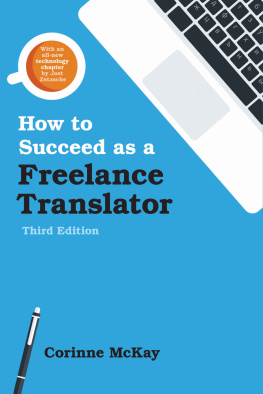
![Korinn MakKej - How to Succeed as a Freelance Translator [calibre 3.46.0]](/uploads/posts/book/876928/thumbs/korinn-makkej-how-to-succeed-as-a-freelance.jpg)

